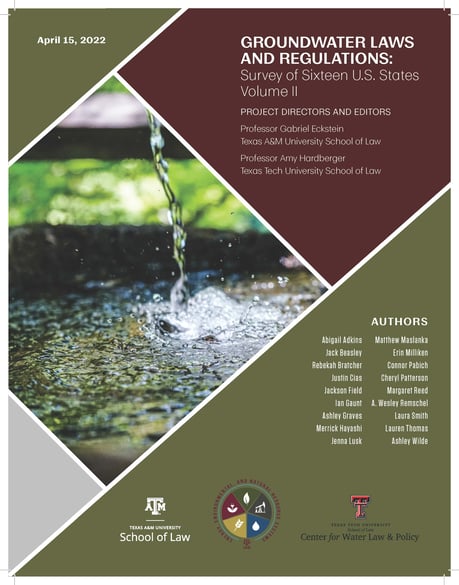PROFESSOR ECKSTEIN AND STUDENTS PUBLISH SECOND VOLUME OF U.S. GROUNDWATER LEGAL SURVEY
Professor Gabriel Eckstein of Texas A&M University School of Law and Professor Amy Hardberger of Texas Tech University School of Law, along with a crew of their student researchers, have published Volume II of Groundwater Laws and Regulations. This latest volume includes surveys from the sixteen U.S. states, including: Alaska, Arizona, California, Connecticut, Idaho, Kansas, Kentucky, Massachusetts, Montana, New Mexico, New York, Ohio, South Carolina, Virginia, West Virginia, and Wyoming.
 Volume I was issued in a preliminary form in August 2017 to generate feedback about the methodology, accuracy of information, organization, and usefulness of the project and its findings. Building on the numerous comments and suggestions received, Volume I was then reissued in April 2020 as a second edition, offering more expanded and comprehensive surveys of the groundwater laws and regulations for the thirteen states in that volume. States surveyed in that volume include: Alabama, Arkansas, Colorado, Florida, Illinois, Indiana, Louisiana, Missouri, Mississippi, Oregon, Tennessee, Texas, and Washington. The remaining 21 states are slated for Volume III, which Eckstein hopes will be issues sometime in 2024.
Volume I was issued in a preliminary form in August 2017 to generate feedback about the methodology, accuracy of information, organization, and usefulness of the project and its findings. Building on the numerous comments and suggestions received, Volume I was then reissued in April 2020 as a second edition, offering more expanded and comprehensive surveys of the groundwater laws and regulations for the thirteen states in that volume. States surveyed in that volume include: Alabama, Arkansas, Colorado, Florida, Illinois, Indiana, Louisiana, Missouri, Mississippi, Oregon, Tennessee, Texas, and Washington. The remaining 21 states are slated for Volume III, which Eckstein hopes will be issues sometime in 2024.
The purpose of the project is to survey the groundwater water quantity rules and regulations of every state as a precursor for the next stage of the project—to develop substantial comparisons of groundwater governance principles, strategies, issues, and challenges across the United States. Those comparisons will be undertaken once the individual surveys are finalized.
“We hope that the surveys and the eventual analyses will help states and the federal government to explore new mechanisms and approaches for improving groundwater management,” Eckstein said. He added that he also hopes that the work “will serve as a useful resource of information for property owners, water rights holders, water managers, and even the private sector.”
Graduating law student, Abigail Adkins, who served as one of the managers for the survey project said “the best thing I learned from the project is seeing how the states differ in resolving similar issues. Getting to see how different states manage groundwater was fascinating, especially in really unique issues like Native American rights.”
The project implemented a rigorous review process to ensure, the accuracy of the collected information. Once a student completed the questionnaire, a more experienced law student reviewed the work and offered recommendations. Once recommended edits were made, Professors Eckstein and Hardberger reviewed the survey and offered additional comments and suggestions. Once a survey was finalized internally, it was sent out for a third-level review by one or more in-state water law experts.
All students who participated in the project are recognized as full co-authors of each published volume in which surveys they worked on appear. Justin Cias, who is also graduating and co-managed the project with Adkins, said “Getting to work on such an ambitious research project for a long period of time not only provided me with the advanced research skills needed as a lawyer, but it also provided the ability to look at the project from a larger perspective, and to manage other students and help them with their research.” Cias added that, “Overall, this project allowed me to work on a topic I am incredibly passionate about and helped me develop fundamental skills to aid me in my future legal career.”